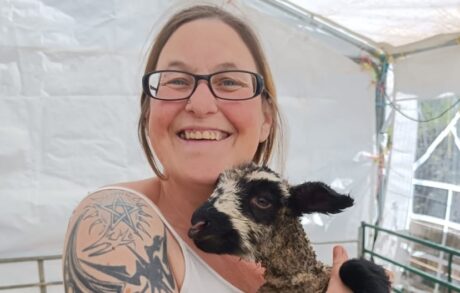Entrepreneur: Julian Parmiter
Industry: Education
Business location: London
Encouraging creativity
Julian has a long history of TV and video production, and has worked on documentaries for both ITV and the BBC. But the inspiration for Create Academy came not from his professional background, but his personal life. “We took time out as a family to go travelling around the world,” says Julian. “And during that time we were really inspired as a family to bring more creativity into our daily lives. The more creative we are, the more fulfilled we feel in every area of life.”
That led directly to Create Academy, which Julian grew out of his existing production company and launched in 2019 with interior designer Rita Konig. Since then it has gone on to expand its line-up to include such names as chef and restaurateur Thomasina Miers, horticulturist and landscape gardener Dan Pearson OBE, and renowned designer Nina Campbell.
He says: “We want to help people not only learn from the best designers, gardeners, makers and chefs working today, but build their confidence so they can put into practice what they see on the screen.”
Scaling the business
Julian highly recommends taking a bootstrap approach to funding, at least in the early days. This means funding your business using your own money.
“This helped us be really lean, really agile, really responsive to what our growing community of learners wanted, rather than adapting or shaping the vision early on to what investors required,” he explains.
Since then, Create Academy has raised funding from a select group of angel investors alongside one venture capitalist. This was to build out the business’s tech platform and accelerate the launch of its online courses.
Initially, Create Academy was using ‘out of the box’ software for everything, from a basic WordPress website to a generic video player. “Very quickly as we scaled, there were pain points, particularly within the customer journey,” says Julian. Funding, then, was used to build a bespoke website, one where Create Academy could own every step of the customer journey.
» COMPARE: Business loans
Managing costs
“We want to make learning a joyful experience,” says Julian. “So having a high production value, high quality content, and a beautiful aesthetic, particularly because we are talking about design and craft, has always been really important to us.”
This, of course, isn’t cheap, especially since Create Academy does it all in -house. “Making the courses, and promoting the courses, are our main costs.”
It also requires negotiating with the talent. “We have a revenue share with our instructors, so as the courses gain traction and attract more learners, they receive the benefits too.”
This model has other advantages, as Julian explains: “[The course guides] are our great ambassadors when it comes to acquiring other instructors.”
Going global
While you can set up a business with one audience in mind, the customer base you find can surprise you. This was the case with Create Academy, which suddenly found itself with an unexpected audience in the US.
“We didn’t realise we had a brand that would appeal to US audiences quite so much,” says Julian. “Whether that is the British accent, or whether it’s the designers that we partner with – who are very willing to share their expertise, let people inside their processes, share their secrets, even their little black book of suppliers – it has meant that more than half of our learning community is based in the US.”
Although it has worked out well for Create Academy, it initially brought up problems – but good problems to solve. “How do we connect with our international audience? How do we understand the thought and trend leadership in the US, which is very different from Britain and Europe?”
Yet this only helped to sharpen what Create Academy is. “It probably honed our mission to be the leading destination for lifestyle learning,” says Julian. “We want all our initiatives to trade seamlessly between borders.”
» MORE: How I built a global business
Understanding your customer
“Business is really about people,” says Julian. “Understanding people, and utilising things like empathy, creativity, even compassion, are just as valid, and sometimes even more valid, than obsessing over lifetime value, cost of acquisition, and return on ad-spend.”
Of course, Julian knows those metrics are hugely important. “But it’s crucial to hold the people behind the metrics in your mind, especially when you are bringing new products into the world.”
This article was originally written by Connor Campbell in May, 2023. It has since been edited and updated.








